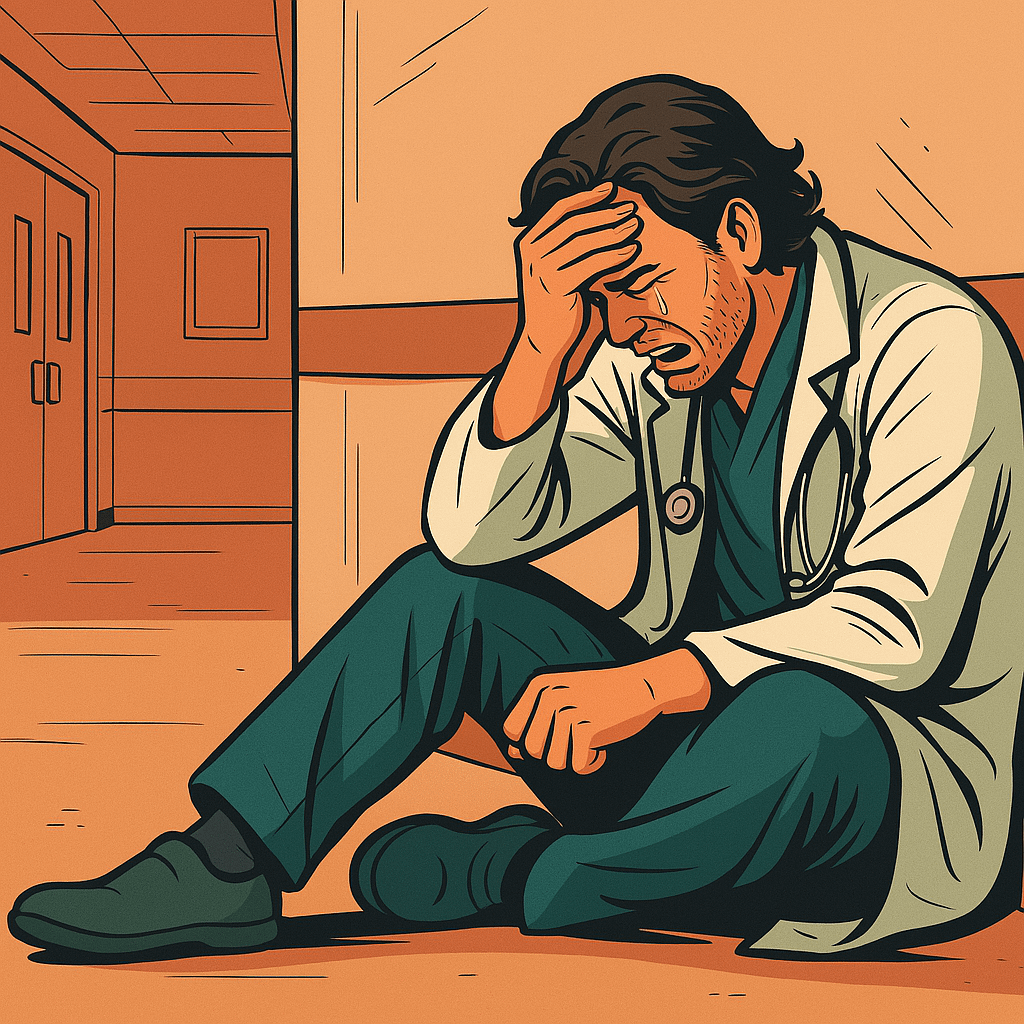It started on a Tuesday.
I remember because the coffee tasted like burnt hope and I didn’t even flinch.
I walked past a colleague crying in the hallway and didn’t stop—
not because I didn’t care,
but because I didn’t feel anything at all.
There was a code that morning.
I did what I always do—moved fast, gave orders, stayed composed.
We lost him. I nodded, documented, washed my hands.
Then I stared at the water running over my gloves like it was supposed to mean something.
That night, I sat in my car for an hour after shift, hands still trembling.
Not from grief.
From the terrifying realization that I felt nothing.
No sadness. No anger. Just… empty.
And that’s when I finally understood what doctor burnout really looks like.
It’s not drama. It’s detachment.
It’s not falling apart. It’s fading out slowly, so quietly no one even notices.
Table of Contents

And if you need a break from all the seriousness of doctor burnout, check out our funny medical condition names we wish were real—because sometimes, laughter really is the best surviving mechanism.
What Doctor Burnout Feels Like
It’s not a breakdown in the way people think.
There are no fireworks. No dramatic collapse in the middle of rounds.
It’s quieter than that.
It’s charting one more case while your chest feels hollow.
It’s giving good news with dead eyes.
It’s laughing in the break room and not feeling it land anywhere inside you.
Burnout doesn’t scream.
It whispers.
You lose interest in things you once loved—patients, cases, even your own victories.
You forget how it felt to be proud of your work.
Sleep doesn’t help. Time off doesn’t help.
You return, and everything is heavier.
You start counting how many shifts are left this week instead of how many lives you’ve helped.
You become efficient, robotic, unshakeable—and people call it resilience.
But it’s not.
It’s the shell of someone who used to care too much.
But here’s the thing no one tells you—
burnout doesn’t just take your energy.
It takes your ability to ask for help.
Why I Didn’t Say Anything
Because I was still doing my job.
Because the charts were complete.
Because my hands didn’t shake in the OR, and no one asked if my heart did after.
I didn’t say anything because I didn’t want to be seen as weak.
Because I’ve seen what happens when a doctor admits they’re struggling—
the silence in the room, the awkward nods, the sudden distance.
So I wore the same mask I told my patients to take off.
The strong one. The calm one. The one that says, “I’m fine.”
But I wasn’t.
And every day I stayed silent, I disappeared a little more.
I Remember the Time I Screamed at My Boss
My shift had ended.
Fifteen minutes ago.
I was still running two ORs. Still moving. Still charting.
She was in the break room, drinking coffee.
She knew I was done.
Or at least she should’ve. But she forgot.
Fifteen minutes.
That’s all it took.
I found her and said, “Hey, I was supposed to leave.”
She looked up—surprised. “Oh. Right. Sorry. I didn’t realize.”
That’s when it happened.
“You didn’t realize?”
My voice cracked. “You forgot?”
I started shaking.
“I’ve been busting my ass in two rooms. I haven’t eaten. I haven’t peed. I’m sprinting around and you’re sitting here drinking coffee, and you FORGOT?”
The words kept coming.
“I give you everything. I stay late. I show up early. I cover everyone. And you can’t remember to send me home?”
My eyes were burning. My throat was raw.
She said nothing.
She just stood there.
I didn’t even care that the ICU could hear me.
I needed her to know:
It wasn’t about fifteen minutes.
It was about feeling invisible. About being used until there’s nothing left.
That’s the truth about doctor burnout.
It’s not always a total collapse.
Sometimes, it’s a single moment that tips the scale—a forgotten shift, a missed goodbye, one more silent expectation that you’ll keep pushing past your limit.
And I couldn’t take that anymore.

If you’re deep in the spiral of doctor burnout, you’ll probably relate a little too hard to the doctor fatigue confessions in The Sleepy Doctor Diaries—because exhaustion in medicine is rarely just about sleep.
When Doctor Burnout Comes Disguised as Loyalty
It’s not that you don’t want a break.
It’s that taking one feels like betrayal.
Because the department is short. The schedule is a puzzle made of broken pieces.
And when you ask for your paid leave, your boss doesn’t say no.
She just looks at you with tired eyes and asks if you really have to.
So you stay.
You stay because no one else is available.
Because your name is already on the board.
Because the idea of your colleagues drowning in your absence feels worse than drowning yourself.
You stay, even though your body is begging you to stop.
Even though the fatigue is making you sloppy.
Even though your family hasn’t seen you in days.
You stay because the system is broken, and it whispers, “Don’t leave them. They need you.”
So you burn.
Quietly. Willingly.
And no one stops you, because everyone is burning, too.
This isn’t just dedication.
It’s survival masquerading as loyalty.
And it’s one of the cruelest forms of doctor burnout—when you become complicit in your own collapse because there’s no other choice.
The Thoughts That Start at 5 A.M.
It doesn’t start with a big life decision.
It starts at the end of a night shift—when you’re staring at the clock like it owes you something.
When every second feels personal.
And you count each one until you can leave.
You stop caring about much—except getting through the next five minutes.
And then five more.
And then maybe, somehow, the rest of the week.
You’re angry.
At the slowness. At the noise. At the patients who won’t stop calling.
At the nurses who ask questions. At the junior who’s too slow.
At yourself—for still being here.
You start thinking things you’re not proud of.
Why are these people so helpless? Why is everyone so damn slow?
But the truth is, it’s not them.
It’s you.
You’re burned out. Exhausted. Fractured.
You start dreaming about quitting, not in a grand dramatic way—
just in a quiet, tired whisper: What if I just didn’t come back next week?
You want out.
Not forever.
Just long enough to remember who you were before this place made you hate everything you used to love.
This is how doctor burnout creeps in.
Not with a bang—but with a watch, a wall clock, and a countdown to survival.

Doctor burnout doesn’t just make you tired—it messes with your judgment too. And if you’ve ever caught yourself Googling symptoms at 2 a.m., you’ll appreciate the brutal honesty in why self-diagnosis is bad (and other things we do anyway).
Who Am I Without the Badge?
You start to ask it quietly.
Not out loud. Not yet.
But it’s there—haunting your morning coffee, echoing in the walk to your car after night shift.
Who am I without this?
Without the title.
Without the pager.
Without the knowing nods when someone says, “They’re a doctor.”
Because medicine becomes your identity.
Not just your job. Not even your purpose.
It wraps itself around your sense of self until it’s hard to tell where the profession ends and the person begins.
And so quitting doesn’t feel like freedom.
It feels like grief.
You cry. Not because you’re weak.
But because the thing that broke you is also the thing you once loved more than anything.
Because you remember what it felt like to care so much it hurt.
And now it just… hurts.
You don’t want to walk away.
You just want to feel like yourself again.
You want to remember who that was—before the badge, before the burnout, before you gave everything away and forgot to keep something for yourself.
This is the most brutal truth about doctor burnout:
It doesn’t just wear you down.
It takes you so far from yourself, even healing feels like betrayal.
Why It’s So Hard to Stay—and Just as Hard to Leave
It’s not just one thing that breaks a doctor.
It’s all of it—layered, constant, and invisible to everyone else.
There’s the financial pressure—not about greed, but survival.
Many healthcare systems offer salaries that don’t match the responsibility, the years of training, or the cost of living.
When you’re working 60-hour weeks and still doing mental math at the grocery store, the math doesn’t make sense anymore.
Then there’s the environmental strain—understaffed wards, chronic overtime, the pressure to perform with perfect precision while running on caffeine and crumbs of sleep.
The workplace becomes a battlefield.
Not against disease, but against depletion.
And beneath it all, there’s the cultural burden—this silent societal belief that because you took the Hippocratic Oath, you’ve vowed to sacrifice endlessly.
To stay, no matter what it costs you.
To never say, “I can’t.”
To never leave, even if staying is killing you slowly.
That’s the cruel irony of doctor burnout:
You’re surrounded by people who need you, a system that expects you, and a culture that canonizes your suffering.
And somehow, you still feel guilty for wanting to breathe.
Taking a Professional Break to Recover From Doctor Burnout
Sometimes, staying in medicine feels like survival.
But if you’re deep in doctor burnout, the only way to truly survive may be to step away from medicine—temporarily.
A professional break for doctors is not quitting.
It’s a conscious, necessary pause before physical or emotional collapse.
It’s choosing to protect your health before the system claims it.
When you’ve been running on autopilot for months—exhausted, detached, and emotionally flat—this kind of pause can become a turning point.
It’s the first step in learning how to recover from doctor burnout.
This break doesn’t have to last forever.
It could be a few months or a year.
But that time away from night shifts, high-stress environments, and clinical decision-making allows space to reset—mentally, physically, and emotionally.
Yes, there may be guilt.
Yes, the fear of stepping away is real.
But if you’re planning to practice medicine long-term, a short pause now can mean decades of sustainable work without total burnout.
Taking a professional pause from medicine can help restore your sense of self, your energy, and your ability to care—without resentment or emotional numbness.
This isn’t weakness.
It’s strategy.
It’s protection.
It’s the oxygen mask you were never taught to reach for.

When You’re Burned Out But Still Breathing: Real Things You Can Do
Let’s be honest: when you’re burned out, you don’t need a deep breath.
You need a way out—or at least a way to stop drowning.
Below are real, unapologetic strategies that won’t ask you to chant affirmations or do yoga in your call room.
They’re designed to help you get through doctor burnout with your self-respect intact—and your options wide open.
Because no job, no matter how noble, is worth losing yourself over.
And here’s something no one tells you when you’re afraid to leave: there is a global shortage of medical professionals.
If you walk out, someone will beg you to walk back in.
You are not as replaceable as the system makes you feel.
So stop being afraid of change. Start building the kind of life where you have the power to say “not like this.”
Find Your One “Hell No”—And Stick to It
Pick one thing you’re done tolerating.
That one shift, one colleague, one unpaid favor.
Decide it’s beneath your mental health—and mean it.
Will they be annoyed? Maybe.
Will you lose your job? Probably not.
But if you do, it’s worth knowing that according to global stats, you’re in one of the most in-demand professions in the world.
In most countries, doctors can find new employment within 30–60 days—faster if you’re willing to explore private, telehealth, or abroad.
I remember the day I decided I couldn’t do it anymore—my hands were still shaking from the last shift when I updated my CV, made one call, and by the next morning, I had a new job offer waiting in my inbox. Less than 24 hours. That’s how fast it can happen when you stop believing the lie that you’re stuck.
The only real risk is staying silent until you disappear.
Start Planning Your Escape (Even If You Never Use It)
Doctor burnout feels worse when you feel trapped.
So give yourself a way out—even if you stay.
Start saving. Build a fund just for you.
Explore skills that could turn into income—writing, coaching, teaching, online courses, Etsy, whatever.
Start a side project. Not a passion project. A plan.
It’s not disloyal. It’s protective.
Doctor burnout loses its power the moment you realize:
I don’t have to stay forever.
Transfer to a Different Department (Yes, Really)
Sometimes it’s not medicine you hate.
It’s where—and with whom—you’re practicing it.
Ask for a rotation. Float for a week.
Shadow in another unit or even a different hospital if possible.
Give your brain a break from the environment where doctor burnout bloomed.
Even just one shift somewhere new can remind you:
It’s not you. It’s the room.
Find a Room Where No One Knows You’re a Doctor
Sign up for an art class.
A wine tasting. A cooking course. A hiking group.
Go somewhere you don’t have to explain what you do, or why you’re tired all the time.
There’s something sacred in being unknown.
In not being “the one in charge.”
In making something with your hands that no one will grade or chart or dissect.
Let your brain wander.
Let your nervous system downshift.
Let the part of you that doesn’t wear scrubs remember how to breathe again.
The Moment You Realize Survival Isn’t Enough Anymore
Doctor burnout makes your world feel small. Like the only choice is collapse or compliance. But it’s not true. You are not boxed in. There are paths—some big, some barely visible—that can lead you back to yourself. Maybe it starts with a boundary. Maybe it starts with a single no. Maybe it starts with the quiet realization that you’re allowed to want more than survival. Even if nothing changes tomorrow, the moment you start considering change—real change—you’ve already taken the first step out.
From One Doctor to Another: You Are Not the Problem
If you’re reading this, you’re likely doing it in a break room that smells like old coffee.
Or at 3 a.m., between patients.
Or maybe after a shift where your legs gave out before your pride did.
I’ve been there.
This isn’t general burnout. This is doctor burnout—the kind that seeps into your bones, that numbs your compassion, that whispers you’re failing even while you’re still saving lives.
But let me say this as one of you, not above you:
You are not the problem.
You are not broken.
You are burned out from a system that was never designed to hold the full weight of your humanity.
You’ve been taught to power through.
To give more. To ask for less.
To wear the exhaustion like it’s part of the job description.
But the truth is: your life is not less important than your role.
You don’t owe your breakdown to anyone.
And recovering from doctor burnout isn’t selfish—it’s survival.
You can take a break. You can say no.
You can leave—and come back on your own terms.
Or not come back at all.
Whatever you choose, know this:
Every one of us has been there.
And you are still a doctor—even when you choose yourself.
Want more brutally honest doctor memes and burnout confessions? Follow us on Facebook at PropofLOL for daily doses of sarcasm and survival.
